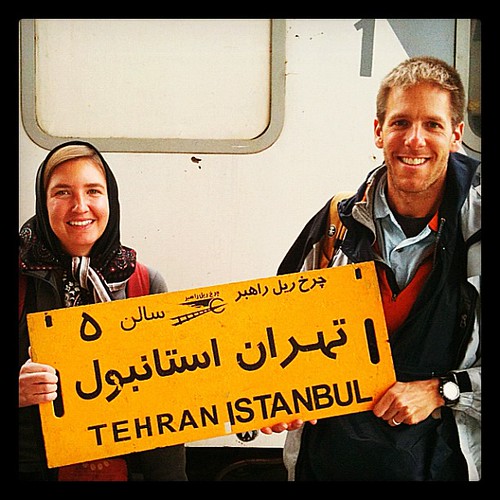Iran is again catching its share of headlines. So it seemed as good a time as any to share the story of our exit from the country at the end of last year — hopping a train en route from Tehran across the border to Turkey, then all the way to Istanbul. One of the finest and most surprising segments of our around-the-world journey.
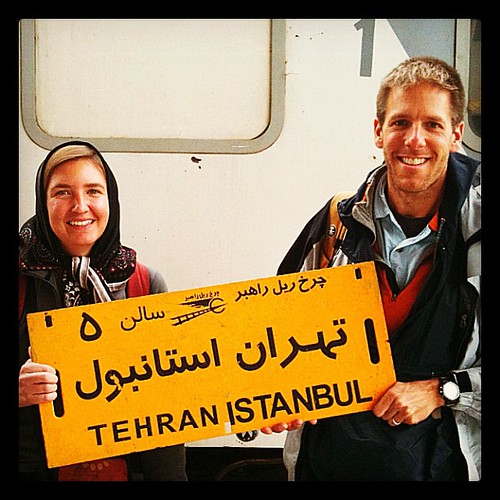
When one of our Iran-savvy friends (thanks, Masha!) put into our heads the idea of taking the train from Iran to Turkey, we couldn’t let go. We love overland journeys and we love trains, but our budget and the time allotted for our Iranian tourist visas both conspired against us. We struggled to make it work, however, and our perseverance eventually paid off.
But there we were the night before departure, train tickets in our hands. This dream train trip of ours was actually going to happen. That’s when a pang of fear set in. Oh boy, what are we getting ourselves into?
Waiting on Tehran
Our train was scheduled to leave at 11:00 A.M from Tabriz in northwestern Iran. We’d arrived at the station at 9:30 A.M. just to be on the safe side. It was the last day of our Iranian visa and we absolutely needed to exit the country. We harbored no interest in reporting what happens to Americans when they overstay their Iranian visas.
When noon arrived, even the horrible movie Orca with Farsi subtitles on the video screen couldn’t diffuse our restlessness. One of the station attendants came over and smiled, “Just relax. The train is delayed from Tehran. It’s usually like this.”
A few hours later, it was finally time to go.
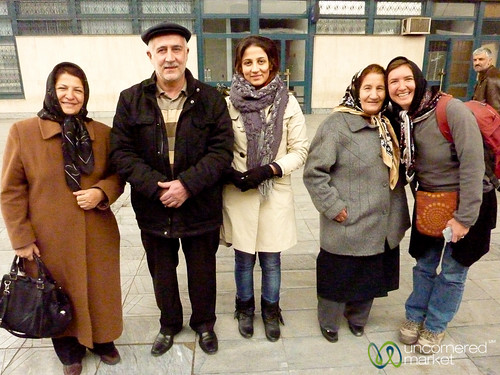
Hanging with fellow passengers at the Tabriz train station.
Iran’s Orient Express
Imagine an Iranian train. I know when I envisioned one, the image resembled that of Midnight Express and harkened to something like an Indian train in the old days — dark, dank, old, and mobbed.
Instead, we found a plush, clean four-person compartment with free water, snacks, and functioning electrical outlets. We continued exploring and landed in a nicely decorated dining car with a full Iranian menu flush (read: kebabs). Sure, the décor reeked of the 1970s and lost hopes to be the Orient Express, but this vessel was downright civilized.
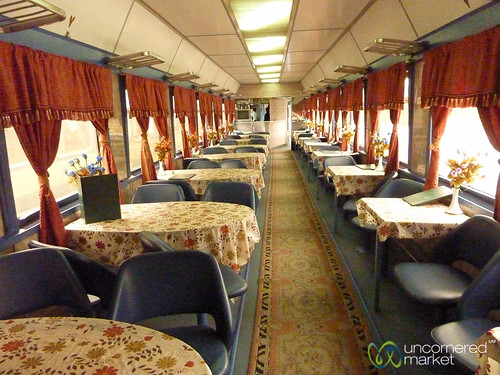
Oh, and did I mention that the cost of this 2.5 day train journey in a 4-person sleeper cost $75 per person?
Our Train Guardian
“I would like to speak with you.” A few minutes after boarding a young Iranian man with a briefcase stood upright in the door of the compartment we’d schemed to carve out for ourselves. His posture and tone suggested he was reporting for duty.
We thought, “Uh oh. Where’s this gonna’ go?”
Formalities out of the way, Abbas introduced himself and we quickly covered the basics — where we had traveled in Iran (a lot of places), where he was going in Turkey (Ankara to study) how often he had taken the train (he was a pro).
When it came time for lunch, we pulled out our feed bag — you know, that ratty plastic bag full of random edible bits and bobs like pistachios, apricots, sunflower seeds, dried pomegranate wraps, a stash of Iranian trail mix, loaves of fresh flat bread, and nomadic Iranian cheese.
Abbas took one look at the snacks and offered an alternative: “I’ll make lunch for us. Don’t worry, I have enough food and tea for all of us.”
He pulled the curtains closed, locked the door, and took out a camping stove. “You’re not supposed to use these on the train, so I need to hide it from the conductor,” he explained.
I made note of his butane canister: “Made in Israel” was plastered across it in big letters.
I joked, “Your camping gas is from Israel. Isn’t that illegal in Iran?”
“You can buy anything in Kurdistan (an area in western Iran),” he smiled. “Everything gets smuggled over the border from Iraq.”
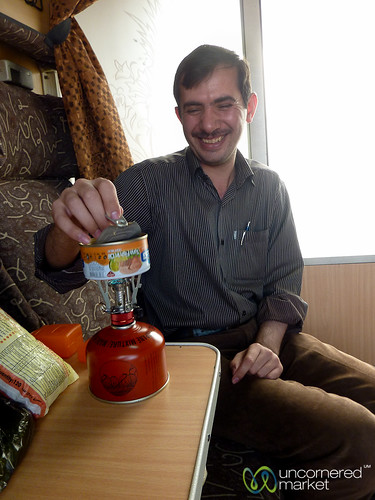
Americans in Iran, on our way to Turkey, eating cans of tuna warmed over Israeli butane. Aren’t we worldly?
Abbas finished the can of tuna over the flame, bubbling, and we stabbed at it with bits of flatbread. It’s true what they say of breaking bread. Surprisingly satisfying on so many levels.
In reality, Abbas didn’t have a lot of extra food, but it was clear he wished to take care of us. He shared whatever he had and he shared generously.
“I will make a tea,” he would say, assembling his arsenal of trainbound tea-making: electrical heating element tongs (also forbidden), a bottle of mineral water, tea bags, cubes of sugar and a thermos.
His mantra: “Tea is very important!”
And it was.
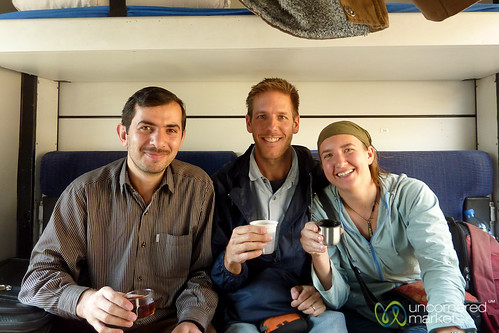
Our last of many teas together just before arrival in Ankara.
Iranian border crossing fears
As the train approached the border with Turkey, my fear and anxiety grew. We were the only two Americans on the train and we were by ourselves, unescorted.
Cue footage of the detained American hikers fresh from an Iranian jail that had scrolled endlessly on the international news just weeks before.
I had expected an interrogation and bag search and was prepared. The night before boarding the train, I cleared my browsing history to erase any sign of blogging, Tweeting and Facebooking, all of which are censored in Iran. I wiped the call records clean on our mobile phones, eliminating any history of contact with Iranian friends during our visit. (I blame my spy novel paranoia on growing up as a daughter of diplomats and having lived in the former Soviet Union).
The border-clearing process began. We were called to the dining car, a few people at a time. Inside a queue formed and we worked our way from dining table to dining table until it was our turn.
The border guard looked up from his reading glasses, over his computer screen and a pile of registry books and papers.
He eyed my entrance stamp to Iran and finger-counted the number of days we’d been in the country. Assured we had not overstayed our visas, he asked where we’d visited and how our trip had been. As I rattled off all the names, I noticed a smile. He was clearly proud.
“Did you enjoy your visit to Iran?”
“Definitely.”
“Good. Enjoy your trip. Please return.”
And that was it. Polite and friendly.
Iran to Turkey: No Man’s Land
The Iran-Turkey borderlands are flush with mountainous landscapes, tiny rural villages, endless contours and the occasional shepherd tending a flock. Through one tunnel to the next, we climbed higher. In this no man’s land, it was impossible to tell exactly where we were. Let’s just say there’s no big “Welcome to Turkey” sign along the way.
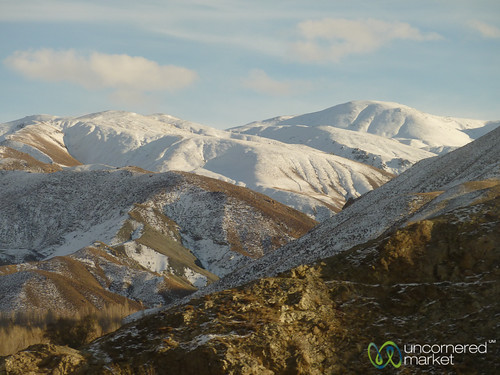
As we descended to civilization, Abbas remarked: “We’re in Turkey now. You can tell by the apartments.”
I was confused. The buildings didn’t look any different to me than the ones we’d seen just 30 minutes before.
“The satellite dishes are out in public. That’s how I know we are in Turkey.”
I looked again with fresh eyes. It was a subtle difference.
As time passed, I noticed women’s headscarves coming off, mine included. The corridors came alive with new sounds as passengers began playing music on their phones and radios.
We were still on an Iranian train, but you could tell we were no longer in Iran.
Across Lake Van: The Turkish Train
Lake Van. Yes, the lake of the same name as the town hit by a devastating earthquake just a month earlier. It’s a wonder the train tracks hadn’t been affected.
Our train was supposed to stop at the eastern edge of the lake at 9:00 P.M. In reality, it was close to 2:00 A.M. when we bade farewell to our Iranian train and boarded the ferry to take us across the lake. The crowd of passengers, we included, looked weary and laden, bags dragging. The ferry was terrifically uncomfortable. The chairs were certainly big enough, but their shape was uniquely designed for torture.
A few hours later, with the sun poised to rise, we arrived on the western shore of Lake Van.
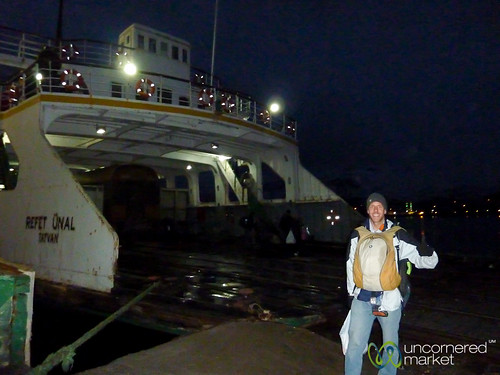
We boarded the Turkish train that would take us the rest of the way. It was more modern than our Iranian train, not quite as plush or roomy, but clean and comfortable enough.
We and Abbas crashed instantly. It was some of the best sleep we’d ever enjoyed on a train.
Iranians Prefer Americans?
When we’re asked how Iranians responded to us as Americans, people are often surprised to hear that we were treated like rock stars. But if we were Elvis on the streets of Iran, we were The Beatles on that train.
Just about every visit to the dining car turned into social hour, as we were engulfed in Iranians hoping to chat, take photos with us, and just hang out. We’d leave with hands and pockets full of nuts and dried fruits as gifts.
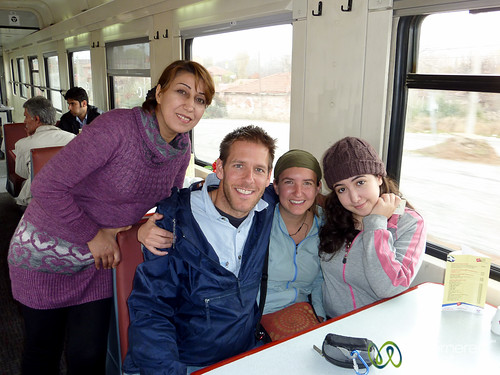
During one dining car interlude, as we were swamped with visitors, a French traveler sat all by himself just a few tables away. He was perfectly nice (we’d talked with him earlier), but to the Iranians on that train, “French” did not hold the same appeal as “American.”
Embarrassing. Almost.
Proud of Iran, Searching for Opportunities Abroad
Later that evening we ventured back into the dining car. After all, we didn’t want to eat all of Abbas’ food. We also secretly wanted a beer. Never had a mediocre not-quite-cold enough Efes tasted so good. (Iran was bone dry when it came to alcohol.)
Amin and Parisa, an Iranian couple we’d met at the Turkish border invited us back to their compartment for a nightcap of more snacks. As we cracked open pistachios (Iranian pistachios are truly among the best in the world) and talked about our travels through Iran, they shared photos of various Iranian historical sites they had visited. You could tell they were proud of their heritage. As graphic designers, they drew from traditional Persian design and calligraphy for their modern creations.
They told their story: “We are on this train to go to the American Embassy in Ankara. We want to apply for a student visa or maybe refugee status. It is impossible for us to live in Iran anymore. During the Green Revolution, Facebook really helped us. But we can’t survive now economically, socially.”
This sort of tale was common. We’d met so many Iranians headed to Turkey to apply for American visas.
Earlier when we had gathered in the dining car, we noticed a man with his young son. He noticed us, too. He’d sit and listen, and when the time was right, he would sit in the booth next to Dan and ask questions, non-sequitur.
“Is Texas good for job?” he asked.
“We won American green card lottery.” (To this day, I don’t understand how such an immigration program exists.)
He left, only to return 30 minutes later.
“If we go to Los Angeles, how do I get driver’s license?” he asked.
“Is Los Angeles good for job? Good life?”
Dan explained how to get a driver’s license and that in some cities, there are probably many Iranian immigrants who can provide practical information and support. To address the more difficult question Dan added, “There are opportunities in America. But success is not guaranteed. And at the moment, jobs are difficult.”
The man quickly left.
He returned once more. “Maybe I think about whether I take my family to America.”
This train, it seemed, was the American Embassy Express.
Goodbyes
Early on our third afternoon together, the train pulled into Ankara. We could feel a shift.
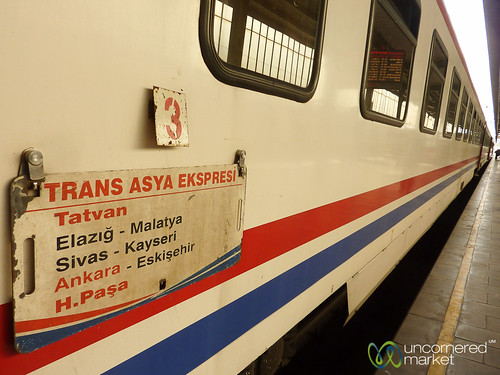
We were aboard all the way to Istanbul, but all our trainmates were getting off — Abbas with his generosity and insight, the dissident artists hoping to make their way to the United States, the woman who’d transcribed a poem for me in the middle of the night, the winner of the green card lottery weighing Los Angeles and Austin, the high school student who paired her unaccented English from watching Friends with dreams of studying in the United States.
While we’d enjoy the space to decompress, we could feel a void. We waved goodbye to our newfound friends as they made their way across the platform.
Our journey was coming to an end, but theirs was just beginning.

